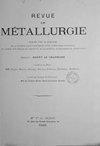Effect of External Stress on the POST-Aging MECHANICAL Properties of Rolled Magnesium Alloys
Revue De Metallurgie-cahiers D Informations Techniques
Pub Date : 2020-01-01
DOI:10.37904/metal.2020.3590
引用次数: 0
Abstract
In the current study the effects of conventional aging and stress aging on the microstructure and mechanical behavior of warm rolled AZ31 magnesium alloy were investigated. Tensile experiments revealed that the ultimate tensile strength (UTS) of the as-received AZ31 increased up to 300 MPa after 24 h aging at 120 °C, with a 2% reduction in ductility. Moreover, yield strength of the rolled and stress aged sample at 120 °C under an external stress of 50 MPa and only for 1 h was improved to 240 MPa. Microstructural observations demonstrate that the grain growth firstly reduced the strength of rolled condition while improving the strain at failure. This was followed by the nucleation of recrystallized grains, enhancing the UTS with acceptable ductility. In addition, fracture surface analysis of stress aged samples demonstrated nucleation-controlled fracture mechanisms with deeper void structures as a ductile characteristic.外应力对轧制镁合金时效后力学性能的影响
本文研究了常规时效和应力时效对热轧AZ31镁合金组织和力学行为的影响。拉伸实验表明,在120℃下时效24 h后,AZ31的极限抗拉强度(UTS)提高到300 MPa,而塑性下降2%。轧制和应力时效试样在120℃下,外加应力为50 MPa,时效1 h,屈服强度提高到240 MPa。显微组织观察表明,晶粒长大首先降低了轧制状态的强度,同时提高了失效应变。随后是再结晶晶粒的成核,使UTS具有可接受的延展性。此外,应力时效试样的断口分析表明,核控断裂机制具有较深的孔洞结构作为延性特征。
本文章由计算机程序翻译,如有差异,请以英文原文为准。
求助全文
约1分钟内获得全文
求助全文
来源期刊
自引率
0.00%
发文量
0
审稿时长
24 months

 求助内容:
求助内容: 应助结果提醒方式:
应助结果提醒方式:


